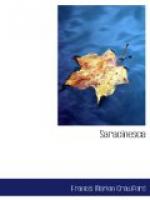“Then I do not know what you can call it,” returned her husband, sharply. “They have always had that dismal black melancholy in that family—that detestable love of secretly piling up money, while their faces are as grave and sour as any Jew’s in the Ghetto.”
Corona glanced at her husband, and smiled faintly as she looked at his thin old features, where the lights and shadows were touched in with delicate colour more artfully than any actress’s, superficially concealing the lines traced by years of affectation and refined egotism; and she thought of Giovanni’s strong manly face, passionate indeed, but noble and bold. A moment later she resolutely put the comparison out of her mind, and finding that her husband was inclined to abuse the Saracinesca, she tried to turn the conversation.
“I suppose it will be a great ball at the Frangipani’s,” she said. “We will go, of course?” she added, interrogatively.
“Of course. I would not miss it for all the world. There has not been such a ball for years as that will be. Do I ever miss an opportunity of enjoying myself—I mean, of letting you enjoy yourself?”
“No, you are very good,” said Corona, gently. “Indeed I sometimes think you give yourself trouble about going out on my account. Really, I am not so greedy of society. I would often gladly stay at home if you wished it.”
“Do you think I am past enjoying the world, then?” asked the old man, sourly.
“No indeed,” replied Corona, patiently. “Why should I think that? I see how much you like going out.”
“Of course I like it. A rational man in the prime of life always likes to see his fellow-creatures. Why should not I?”
The Duchessa did not smile. She was used to hearing her aged husband speak of himself as young. It was a harmless fancy.
“I think it is quite natural,” she said.
“What I cannot understand,” said Astrardente, muffling his thin throat more closely against the keen bright tramontana wind, “is that such old fellows as Saracinesca should still want to play a part in the world.”
Saracinesca was younger than Astrardente, and his iron constitution bade fair to outlast another generation, in spite of his white hair.
“You do not seem to be in a good humour with Saracinesca to-day,” remarked Corona, by way of answer.
“Why do you defend him?” asked her husband, in a new fit of irritation. “He jars on my nerves, the sour old creature!”
“I fancy all Rome will go to the Frangipani ball,” began Corona again, without heeding the old man’s petulance.
“You seem to be interested in it,” returned Astrardente.
Corona was silent; it was her only weapon when he became petulant. He hated silence, and generally returned to the conversation with more suavity. Perhaps, in his great experience, he really appreciated his wife’s wonderful patience with his moods, and it is certain that he was exceedingly fond of her.




